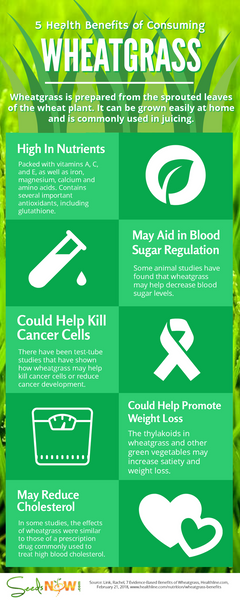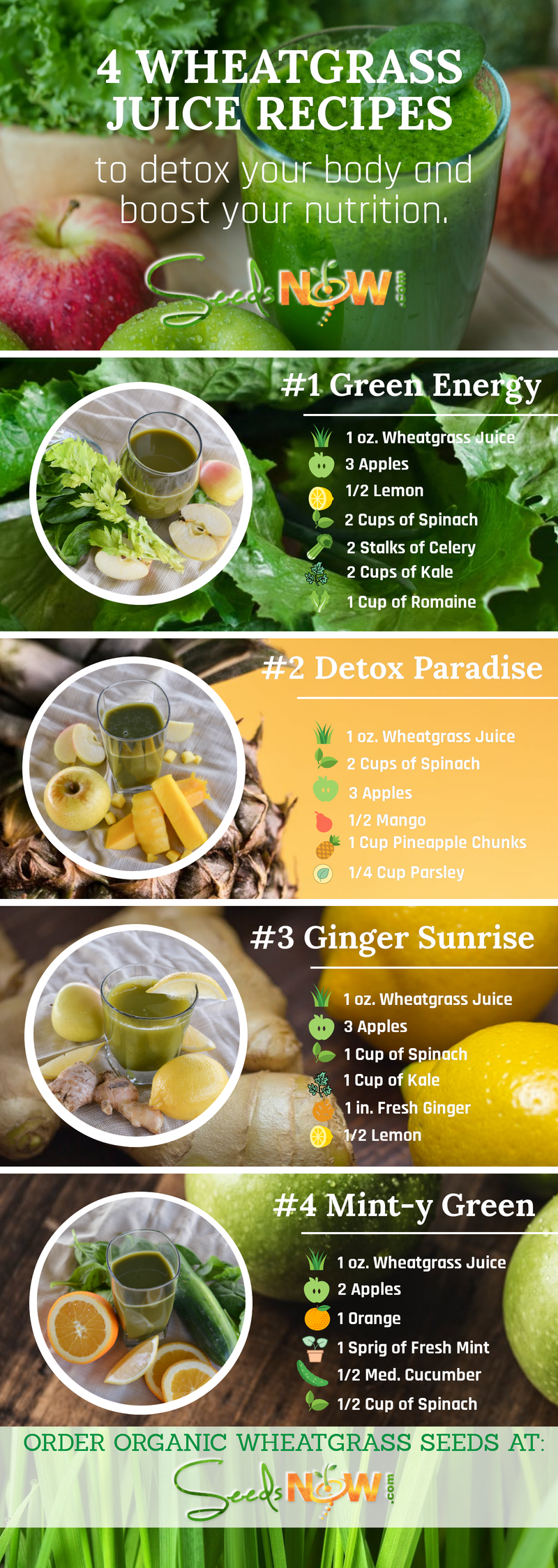Pepper (Hot) - Cayenne, Red 🔥🔥🔥
From $299 USDUnit price /UnavailableDescription

The Red Cayenne Pepper will put a hop, a skip, and a kick in your step. Slender, glossy 5"-6" fruits grow abundantly on strong plants, bounding through all the primary colors as it matures from green to yellow to orange to red. Primarily used as a dried spice, but can be used fresh to rev up a salsa or to make pickling brine howl.If you want to spice it up with a different color, try the beautiful Purple Cayenne Pepper.
- High yields
- Dang spicy
- Harvest any color
- Good for containers
SEED PLANTING TIPS
- Botanical name: Capsicum annuum
- Pepper length: 5"-6"
- Scoville heat units (SHU): 30,000-50,000/hot
- Plant support: Tomato cage or stake
- Depth to plant seeds: .25" deep
- Spacing between plants: 18"-24" apart
- Spacing between rows: 24"-36" apart
- Days to germinate (sprout): 7-21 days
- Germination soil temps: 75F-85F
- Soil needs: 6.0-7.0 pH
- Sun needs: Full sun
- Frost hardy: No
- Planting season: Spring, summer
- # of plants per sq. ft.: Appx. 1 plant per sq. ft.
- Days to maturity: 75-85 days
Good companion plants: Basil, Carrot, Cucumber, Eggplant, Okra, Rosemary, Sage, Squash, Tomato- HOT but delightfully pungent in flavor
- Six inch long, one-half inch thin, green fruits that turn red when mature
- Named after the South American river in Guyana
Additional DetailsCayenne is a popular spice in a variety of cuisines. It is employed variously in its fresh form, dried and powdered, and as dried flakes. It is also a key ingredient in a variety of hot sauces, particularly those employing vinegar as a preservative. Buffalo Wings sauce contains Cayenne pepper.
All Peppers ⟐ Hot Peppers 📚 Hot Peppers Grow Guide - From $299 USDUnit price /Unavailable
Description

The Ancho Grande Pepper is named for its size—ancho is wide, grande is big. That’s when it’s dark red. While it’s still dark green, it’s called Poblano, which is named for a town in Mexico. And when it matures fully to dark brown, the name is Mulato. Vigorous, leafy plants produce grande amounts of tapered heart-shaped 4"-8" fruit with a mellow, smoky flavor and a little bit of heat. This fleshy, thick-skinned pepper is traditionally used for chiles rellenos and mole sauce, but you can probably think of a few more uses while you’re studying for the quiz about its name.- High yields
- Mellow, smoky flavor
- Thick skin
- Good fresh, cooked, and dried
SEED PLANTING TIPS
- Botanical name: Capsicum annuum
- Pepper length: 4"-8" long by 3" wide
- Scoville heat units (SHU): 1,000-2,000/mild
- Plant support: Tomato cage or stake
- Depth to plant seeds: .25" deep
- Spacing between plants: 24"-36" apart
- Spacing between rows: 36"-48" apart
- Days to germinate (sprout): 7-21 days
- Germination soil temps: 75F-85F
- Soil needs: 6.0-7.0 pH
- Sun needs: Full sun
- Frost hardy: No
- Plant height: 36"
- Planting season: Spring, summer
- # of plants per sq. ft.: Appx. 1 plant per 3 sq. ft.
- Days to maturity: 75-85 days
Good companion plants: Basil, Carrot, Cucumber, Eggplant, Okra, Rosemary, Sage, Squash, Tomato
All Peppers ⟐ Hot Peppers 📚 Hot Peppers Grow Guide - From $299 USDUnit price /Unavailable
Description
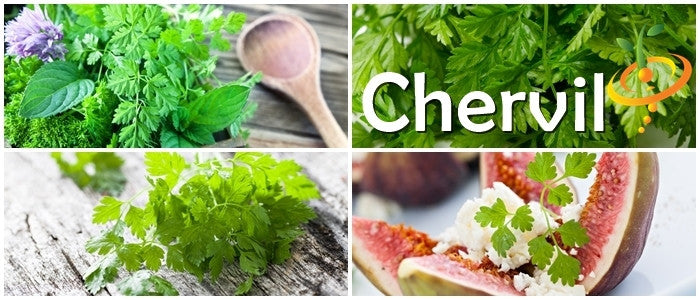
Chervil, also called French Parsley and Garden Chervil, is an ancient aromatic annual in the parsley family, with similar fern-like leaves, tiny white flowers, and a sweet flavor that’s a delicate mix of parsley, anise, and pepper. Leaves, stems, seeds, and flowers are all edible. It prefers growing in part shade in moist soil with cool temps, so it’s good for indoor gardens or fall/winter gardens in mild climates. An important ingredient in fines herbes, along with chives, parsley, and tarragon, used extensively in French gourmet cooking. Loses its flavor when dried, so chop or chiffonade to add a freshness to salads, dressings, herb butter, sauces, seafood, peas, poultry, green beans, carrots, eggs, and herbal tea.
As a companion plant, it attracts pollinators and beneficial insects, and repels ants, aphids, slugs, and snails.
As a medicinal herb, Chervil has been used internally to treat arthritis, bronchitis, congestion, cough, gum disease, hiccups, low blood pressure, menstrual cramps, skin problems, and swelling, and externally to treat painful joints, tired eyes, and wounds.
YIELD Medicinal properties are presented as information only, and are not a recommendation or prescription for use. Consult a medical professional before using any herb medicinally.
- Parsley-anise-pepper flavor
- All parts are edible
- Good for indoor gardens
- Good for containers
SEED PLANTING TIPS
- Botanical name: Anthriscus cerefolium
- Life cycle: Herbaceous annual
- Hardiness zones: 3-10
- Planting season: Spring, fall
- Days to maturity: 40-60 days; can begin harvesting when 6" tall
- Depth to plant seeds: 1/4" deep
- Days to germinate (sprout): 14-28 days
- Germination soil temps: 55F-65F
- Spacing between plants: 9"-12" apart
- Spacing between rows: 18"-24" apart
- # of plants per sq. ft.: Appx. 1 plant per sq. ft.
- Soil types: Sandy, loamy, rich, moist, well-drained
- Soil pH: 6.0-7.5
- Sun needs: Full sun, part shade, full shade
- Water needs: Average
- Cold stratify: No
- Frost tolerant: Yes
- Heat tolerant: No
- Drought tolerant: No
- Deer resistant: Yes
- Culinary use: Yes
- Medicinal use: Yes
Good companion plants: Broccoli, Carrot, Cilantro/Coriander, Dill, Lettuce, Mint, Radish, Yarrow
More facts about Chervil:
- Pregnant women were bathed in an infusion of it; a lotion of it was used as a skin cleanser; and it was used medicinally as a blood purifier.
- It was also claimed to be useful as a digestive aid, for lowering high blood pressure, and, infused with vinegar, for curing hiccups
See Chervil Recipes & Growing Tips on our Pinterest Board
Follow SeedsNow.com's board Chervil on Pinterest. - From $299 USDUnit price /Unavailable
Description

Caraway is an ancient aromatic herb, famous for being the spice in rye bread and German sauerkraut. A biennial in the carrot family that grows 1'-3' tall, with feathery foliage and tiny white flowers. The seeds, which have an earthy-citrusy-peppery flavor, are the most used, but the flowers, leaves, stems, and root (which looks like a small parsnip, and can be used like any other root vegetable) are also edible. While you’re waiting for the flowers, seeds, and roots to develop in the second year, spend the first year using the leaves, which have a parsley-dill flavor, in salads, soups, and sautés.
- Parsley-dill flavor
- All parts are edible
- Culinary and medicinal uses
- Good for containers
As a companion plant, it attracts pollinators and beneficial insects, and repels aphids, cabbage moths, cabbage white butterfly, cabbage worms, carrot root fly, and caterpillars.As a medicinal herb, Caraway has been used internally to treat asthma, bad breath, bloating, colds, colic, cough, flatulence, heartburn, indigestion, insomnia, lack of appetite, nausea, sore throat, and stomach cramps, and externally to treat arthritis, bruises, burns, skin irritation, toothache, and wounds.
⚠️ Medicinal properties are presented as information only, and are not a recommendation or prescription for use. Consult a medical professional before using any herb medicinally.
SEED PLANTING TIPS
- Botanical name: Carum carvi
- Life cycle: Herbaceous biennial
- Hardiness zones: 4-9
- Planting season: Spring, fall
- Days to maturity: 70 days-2 years; can begin harvesting when 6" tall
- Depth to plant seeds: 1/4" deep
- Days to germinate (sprout): 7-14 days
- Germination soil temps: 65F-75F
- Spacing between plants: 8"-12" apart
- Spacing between rows: 18"-24" apart
- # of plants per sq. ft.: Appx. 2 plants per sq. ft.
- Soil types: Sandy, loamy, chalky, poor, rich, moist, well-drained
- Soil pH: 6.0-7.5
- Sun needs: Full sun, part shade
- Water needs: Average
- Cold stratify: No
- Frost tolerant: Yes
- Heat tolerant: No
- Drought tolerant: Yes
- Deer resistant: Yes
- Culinary use: Yes
- Medicinal use: Yes
Good Companion Plants: Bean, Beet, Blueberry, Broccoli, Brussels Sprouts, Cabbage, Carrot, Cauliflower, Chard, Collards, Fava Bean, Kale, Mustard, Onion, Pea, Radish, Soybean, Strawberry, Tomato


What is Caraway?Caraway is a biennial. This means it takes two years for the plant to mature, produce seeds, then die. During the winter you may not see any evidence of the plant even though the roots are preparing for spring. So mark your spot carefully so you don’t accidentally dig them up in the spring.
An interesting legend that goes along with Caraway is that it had the power to prevent the theft of objects that had seeds nearby and it also kept lovers from losing interest in one another. Still, some believe Caraway has beneficial healing powers and you can use the oil, fruit and seeds as medicine.

Health Benefits of CarawayWomen can use Caraway oil to relieve menstral cramps. Feeling bloated or have a bit of indigestion? Chewing on a few Caraway seeds can help relieve your symptoms!

Ways to Consume CarawayIf you want to consume the leaves, pick them when they are young and tender. The roots are also edible when the plant is young. Use Caraway seeds in baked goods, such as breads, and buns. Add them to vegetable and fruit dishes, especially curries. Use leaves and seeds alike to make hot and cold teas.
Caraway seeds have a sharp, pungent, slightly licorice taste that’s is delicious with green beans, potatoes, cabbage, onions, brussels sprouts, tomatoes, and apples. Try mixing it with cucumber and sour cream. It’s delicious with sausage and beef.


See Caraway Recipes & Growing Tips on our Pinterest Board
- From $299 USDUnit price /Unavailable
Description
- From $299 USDUnit price /Unavailable
Description

The Green Globe Artichoke produces a large, delicious green flower bud that opens into a purple thistle if left to flower. Choose a sunny spot in your garden with lots of room for this plant to grow. Artichokes are perennial plants that keep coming back bigger and more productive every year. For a dramatic difference in color, try growing the Violet Star Artichoke.- Drought tolerant
- Heat tolerant
- Usually produces in 2nd year
- Perennial
- From $299 USDUnit price /Unavailable
Description

Anise (Pimpinella anisum), also called Aniseed, is a sweet, aromatic annual in the parsley family.
The leaves and flowers are lacy, delicate, and delicious, and plants can grow 2'-3' tall.
With a fresh licorice flavor, use as you would Tarragon and Fennel in both savory meat and vegetable dishes, salads and dressings, and sweet baked goods, such as biscotti.
Chew the seeds for a natural breath freshener and digestif. Its aromatic seeds are also used for cooking and herbal medicine.
You may be familiar with the anise flavor if you've had absinthe, as anise seeds are the basis for this famous alcoholic beverage.
- Licorice flavor
- Edible seeds and leaves
- Culinary and medicinal
- Good for containers
As a companion plant, it attracts pollinators and beneficial insects, and repels aphids, cabbage moths, cabbage white fly, cabbage worms, slugs, and snails, but is strangely irresistible to bears, deer, dogs, and mice.
As a medicinal herb, Anise has been used internally to treat bad breath, bloating, constipation, cough, flatulence, hot flashes, indigestion, lack of appetite, migraine headaches, and upset stomach, and externally to treat bronchitis, eye pain, and swelling.
⚠️ Medicinal properties are presented as information only, and are not a recommendation or prescription for use. Consult a medical professional before using any herb medicinally.
- From $299 USDUnit price /Unavailable
Description
With its showy display of cascading red flowers, Red Garnet Amaranth is both beautiful and delicious. You can cook the leaves as you would any other green, and harvest the seeds for a healthy grain that's rich in minerals and protein.
- Easy to grow.
- Heat tolerant.
- Drought resistant.
- Can grow to 10+ feet with the right soil and growing conditions.
Lettuce - Marvel of Four Seasons
From $299 USDUnit price /UnavailableDescription

Marvel of Four Seasons lettuce plant, also known as Lactuca sativa, is a popular variety of lettuce that is highly sought after by gardeners and salad enthusiasts. This unique lettuce variety is known for its beautiful red and green leaves, making it a visually appealing addition to any garden or salad bowl.
Marvel of Four Seasons lettuce is a cool-season crop that thrives in mild climates and can be grown in both spring and fall. It is a loose-leaf lettuce variety, which means that the leaves grow in a loose, open head rather than forming a tight, compact head like other lettuce varieties.
One of the key features of Marvel of Four Seasons lettuce is its exceptional taste. The leaves have a delicate, buttery flavor with a slight hint of bitterness, making it a versatile ingredient in salads, sandwiches, and wraps. Its crisp texture adds a refreshing crunch to any dish.
Growing Marvel of Four Seasons lettuce is relatively easy, making it a great choice for both beginner and experienced gardeners. It prefers well-drained soil and requires regular watering to keep the soil moist. This lettuce variety can be grown in containers, raised beds, or directly in the ground.
When planting Marvel of Four Seasons lettuce, it is important to sow the seeds thinly and cover them with a thin layer of soil. The seeds should be spaced about 6 inches apart to allow room for the plants to grow. It is recommended to provide the plants with partial shade to protect them from excessive heat.
Harvesting Marvel of Four Seasons lettuce is a rewarding experience. The leaves can be harvested individually as needed or the entire plant can be harvested at once. To harvest the leaves, simply cut them off at the base using a sharp knife or scissors. The plant will continue to produce new leaves, allowing for multiple harvests throughout the growing season.
Marvel of Four Seasons lettuce is not only a delicious and visually appealing addition to your garden, but it is also packed with nutritional benefits. It is a good source of vitamins A and K, as well as folate and fiber. Adding this lettuce variety to your diet can contribute to a healthy and balanced lifestyle.
Whether you are a seasoned gardener or just starting out, Marvel of Four Seasons lettuce is a fantastic choice for your garden. Its beautiful appearance, delicious taste, and nutritional benefits make it a must-have for any lettuce lover. Start growing your own Marvel of Four Seasons lettuce today and enjoy the satisfaction of harvesting your own fresh, homegrown lettuce.
Click here for our complete Lettuce grow guideCandytuft, Fairy Dwarf Mix Flowers
From $299 USDUnit price /UnavailableDescription
The Fairy Dwarf Candytuft Mix (Iberis umbellata) is a drought-tolerant, low-lying annual with sweet, delicate flowers in an array of white, rose, lavender, and red. Loves full sun, but will tolerate partial shade. Good for ground cover, cottage gardens, or containers.
- Life cycle: Annual
- Bloom season: Spring, summer
- Attracts: Bees, butterflies, moths, and other pollinators
- Flower meaning: Beauty, indifference, joy, sweetness, vitality
SEED PLANTING TIPS
- Botanical name: Iberis umbellata
- Hardiness zones: 3-9
- Planting season: Spring, fall
- Days to maturity: 55-70 days
- Cold stratify: No
- Depth to plant seeds: Lightly cover - seeds need light to germinate
- Spacing between plants: 8"-12" apart
- Days to germinate (sprout): 20-30 days
- Germination soil temps: 70F-80F
- Soil types: Sandy, loamy, dry, well-drained
- Soil pH: 6.0-8.0
- Water needs: Average
- Sun needs: Full sun, part shade
- Frost tolerant: No
- Drought tolerant: Yes
- Deer resistant: No
Carrot - Lunar White, 12" Long
From $299 USDUnit price /UnavailableDescription
The Lunar White Carrot (Daucus carota) is a creamy-white carrot with a small core and mild, sweet flavor that grows 8"-12" long. Harvest sooner for smaller carrots. Half-hardy to frost and light freezes. Good steamed, roasted, and fresh.
- Sweet, mild flavor
- Size: 8"-12" long
- Days to germinate (sprout): 7-21 days
- Days to maturity: 70-75
- Can be harvested sooner for mini carrots
Good companion plants: Broccoli, Cauliflower, Chives, Lettuce, Onion, Parsley, Peas, Rosemary, Sage, Thyme, Tomato
SEED PLANTING TIPS
- Depth to plant seeds: .25" deep
- Spacing between plants: 2" apart
- Spacing between rows: 18"-24" apart
- Days to germinate (sprout): 7-21 days
- Germination soil temps: 65F-85F
- Soil needs: 6.0-6.8 pH
- Sun needs: Full sun
- Hardiness: Half-hardy to frost and light freezes
- Planting season: Spring, fall
- # of plants per sq. ft.: Appx. 16 plants per sq. ft.
- Days to maturity: 70-75 days
Sunflower, Maximillian Flowers
From $299 USDUnit price /UnavailableDescription
The Maximillian Sunflower (Helianthus maximiliani) is a drought-tolerant perennial. Produces a 3"-5" blossom with veined, pointed bright yellow petals around a dark golden center. Grows 3'-10' tall on branching, hairy stems with multiple blooms per stem, and long, narrow, drooping foliage. Bold, robust, and cheerful.
- Life cycle: Perennial
- Bloom season: Summer
- Attracts: Birds, bees, butterflies, and other pollinators
- Flower meaning: Admiration, devotion, happiness, honesty, loyalty, optimism, peace, vitality
SEED PLANTING TIPS
- Botanical name: Helianthus maximiliani
- Hardiness zones: 4-9
- Planting season: Spring, fall
- Days to maturity: 90-100 days
- Cold stratify: Yes
- Depth to plant seeds: 1/2" deep
- Spacing between plants: 36"-48" apart
- Days to germinate (sprout): 7-25 days
- Germination soil temps: 65F-70F
- Soil types: Clay, sandy, loamy, rocky, dry, well-drained
- Soil pH: 6.5-7.8
- Water needs: Low - do not overwater
- Sun needs: Full sun
- Frost tolerant: No
- Drought tolerant: Yes
- Deer resistant: Yes
Globe Gilia (Queen Anne’s Thimble) Flowers
From $299 USDUnit price /UnavailableDescription
The Globe Gilia (Gilia capitata) is an easy-care drought-tolerant annual. Produces globe-shaped 1"-2" blue-hued flowers on thin stems with lacy foliage that grow 2' to 3' tall. Also called Queen Anne’s Thimble for its resemblance to a pincushion.
- Life cycle: Annual
- Bloom season: Spring, summer
- Attracts: Bees, butterflies, beneficial insects, and other pollinators
- Flower meaning: Affection, beauty, desire, hope, inspiration, love
SEED PLANTING TIPS
- Botanical name: Gilia capitata
- Hardiness zones: 3-10
- Planting season: Spring, fall
- Days to maturity: 60 days
- Cold stratify: Yes
- Depth to plant seeds: 1/8" deep
- Spacing between plants: 6"-8" apart
- Days to germinate (sprout): 14-21 days
- Germination soil temps: 70F-75F
- Soil types: Sandy, loamy, rocky, dry, well-drained
- Soil pH: 6.0-7.0
- Water needs: Low - do not overwater
- Sun needs: Full sun
- Frost tolerant: No
- Drought tolerant: Yes
- Deer resistant: Yes
Blazing Star (Gayfeather) Flowers
From $299 USDUnit price /UnavailableDescription
The Blazing Star/Gayfeather flower (Liatris spicata) produces a long, spiky, fluffy flower that begins blooming at the top of the stem, working its way down until it looks like a wild bottlebrush. This hardy perennial is tolerant of heat, drought, frost, and cold. Stem grows 2'-3' tall, with the purple, pink, or white flower taking it as tall as 6'.
- Life cycle: Perennial
- Bloom season: Summer, fall
- Attracts: Hummingbirds, bees, butterflies, and other pollinators
- Flower meaning: Blissfulness, happiness, joy
SEED PLANTING TIPS
- Botanical name: Liatris spicata
- Hardiness: Zones 3-10
- Planting season: Spring, fall
- Days to maturity: 55-70 days
- Cold stratify: Yes
- Depth to plant seeds: Lightly cover - seeds need light to germinate
- Spacing between plants: 8"-12" apart
- Days to germinate (sprout): 21-35 days
- Germination soil temps: 65F-75F
- Soil types: Clay, sandy, loamy, rocky, chalky, moist, well-drained
- Soil pH: 5.5-7.5
- Water needs: Average
- Sun needs: Full sun
- Frost tolerant: Yes
- Drought tolerant: Yes
- Deer resistant: Yes
- From $299 USDUnit price /Unavailable
Description
Green leaf with red veins have a slightly tangy lemon flavor which adds zest to salads and is especially good with fish. The leaves grow up to 8" long and can also be cooked like spinach or even used in soups. Sure to be your new favorite.
55 days to maturity
Carrot - St. Valery/James Scarlet, 12" Long
From $299 USDUnit price /UnavailableDescription
- Old French variety that produces extremely sweet and delicious carrots up to 12” in length
- Tender, sweet, and smooth roots
-
Also known as the “James Scarlet”
-
Days to Maturity | 70 days
-
Carrot Seeds | Carrots are an annual cool-season crop, half-hardy to frost and light freezes. Sow seeds evenly in a very shallow furrow, about 1/4 inch deep, and keep seeds moist so they will germinate.
Click here for complete Carrot grow guide
Additional Details
Carrot gets its characteristic and bright orange colour from β-carotene, which is metabolised into vitamin A in humans when bile salts are present in the intestines. Carrots are also rich in dietary fibre, antioxidants, and minerals.
- Old French variety that produces extremely sweet and delicious carrots up to 12” in length
Onion - Walla Walla Sweet (Long Day)
From $299 USDUnit price /UnavailableDescription

- The Walla Walla Sweet Onion variety will produces a globed shaped white onion
- Bulbs can reach 2 lbs
- This is one of the most popular Long day onion varieties available
- Easy to grow
- Perfect for beginners
- Grows well in containers and tight spaces
-
Days to Maturity | 110-120 days
Onion Seeds | Onions are easy to grow, have a fairly short growing period and take up little space in the garden. Plant onions 1/4 inch deep and 3 to 4 inches apart in double rows, leaving 6 to 10 inches between rows.
Click here for complete Onion grow guide
- The Walla Walla Sweet Onion variety will produces a globed shaped white onion
Pepper (Hot) - Habanero, White 🔥🔥🔥🔥
From $299 USDUnit price /UnavailableDescription

The White Habanero Pepper produces lots of small 1"-2" fruits, all of them infused with smoky, sweet flavor and a heat like white lightning. These little thunderbolts start out green and ripen to a glossy pearl. Use them to wake up a pot of white bean chicken chili or add a flash of fire to a jar of mayonnaise.- Very high yields
- Sweet, citrusy flavor
- Hot enough to make a monkey cough
- Good for containers
SEED PLANTING TIPS
- Botanical name: Capsicum chinense
- Pepper length: 1"-2"
- Scoville heat units (SHU): 100,000-300,000/very hot
- Plant support: Tomato cage or stake
- Depth to plant seeds: .25" deep
- Spacing between plants: 18"-24" apart
- Spacing between rows: 24"-36" apart
- Days to germinate (sprout): 10-30 days
- Germination soil temps: 75F-85F
- Soil needs: 5.0-6.0 pH
- Sun needs: Full sun
- Frost hardy: No
- Planting season: Spring, summer
- # of plants per sq. ft.: Appx. 1 plant per sq. ft.
- Days to maturity: 85-105 days
Good companion plants: Basil, Carrot, Cucumber, Eggplant, Okra, Rosemary, Sage, Squash, Tomato
All Peppers ⟐ Hot Peppers 📚 Hot Peppers Grow Guide Watermelon - Moon & Stars (Red-flesh)
From $299 USDUnit price /UnavailableDescription
- The Moon & Stars Watermelon dark green rind and bright yellow spots.
- Yellow spots are very unique and can be small or large in size.
- All American classic heirloom watermelon. - Deep red flesh.
- Grows over 40 lbs!
-
Day to Maturity | 90 days
- Watermelons are heat-loving plants that need lots of sun. They grow on a long vine, so make sure to give them plenty of space to roam around.
Follow SeedsNow.com's board Watermelon on Pinterest. - The Moon & Stars Watermelon dark green rind and bright yellow spots.
Tomato - Big Rainbow (Indeterminate)
From $299 USDUnit price /UnavailableDescription
The Big Rainbow Tomato is a popular ribbed beefsteak variety that produces 1-2 lb fruits. A favorite among gardeners for its marbled palette of orange, red, and yellow skin coloring that continues through to the flesh. Taming all that wildness is a little pot of gold flavor that is well-balanced between acidic and sweet. Heavy producer, so stake well.
- High yields
- Extra large fruit
- Well-balanced flavor
- Hearty slicer
SEED PLANTING TIPS
- Botanical name: Solanum lycopersicum
- Growth type: Indeterminate, trellis support, regular pruning
- Tomato size: Large (1-2 lbs.)
- Depth to plant seeds: .25" deep
- Spacing between plants: 24"-36" apart
- Spacing between rows: 36"-48" apart
- Days to germinate (sprout): 7-14 days
- Germination soil temps: 75F-95F
- Soil needs: 6.0-6.5 pH
- Sun needs: Full sun
- Frost hardy: No
- Planting season: Spring, summer
- # of plants per sq. ft.: Appx. 1 plant per 3 sq. ft.
- Days to maturity: 85-95 days
Click here to view our full Tomato grow guide
Good companion plants: Basil, Borage, Onion, Parsley, Pepper
Wildflowers - Blues Brothers Seed Mix
From $299 USDUnit price /UnavailableDescription
Plant this mix to grow some of the most beautiful blue-colored flowers you've ever seen!
Wildflower establishment requires some important steps:
- Site selection/preparation: It's important to address competition from weeds: pull, till, or use organic herbicides. If planting in the spring/summer you can wait for weeds to germinate, control and then plant the wildflower seeds.
- Seeding: You will want to have good seed to soil contact, broadcasting by hand is a good approach on small plot, may want to mix with an inert carrier, sand or other. Raking in and covering with soil 2-3 times seed thickness.
- Watering: During establishment for the first month, can be from rain in spring or supplement with irrigation.
- Timing: The best time to plant is in spring to early summer and even again in late fall.
This mix includes all of the following seed varieties:
GENUS/SPECIES COMMON NAME TYPE HEIGHT COLOR 
Centaurea cyanus Bachelor Button, Jubilee Gem or Cornflower Annual 12- 36 Inches Blue 
Centaurea cyanus Chinese Forget-Me-Not or Chinese Hounds Tongue Perennial 18-24 Inches Blue 
Linum lewisii Blue Flax Perennial 18-30 Inches Blue 
Ipomoea alba Morning Glory, Heavenly Blue Annual 8 - 10 Feet Blue 
Lupinus angustifolius Blue Lupine Perennial 12-13 Inches Blue 
Phacelia campanularia California Blue Bells, Desertbells, Desert Bluebells, California-Bluebell, Desert Scorpionweed, and Desert Canterbury Bells. Annual 18-20 Inches Blue 
Nigella damascena Love In a Mist Annual 15 Inches Blue 
Gilia capitata Globe Gilia, Blue-Thimble-Flower, Bluehead Gilia, or Blue Field Gilia Annual 12-24 Inches Blue 
Nemophila menziesii Baby Blue Eyes Annual 6 Inches Blue Nasturtium - Glorious Gleam Flowers
From $299 USDUnit price /UnavailableDescription
Semi-trailing plant with fragrant flowers that come in a variety of shades and colors.
Depth to Plant
Spacing Between Plants
Days to Germinate (Sprout)
Germination
Soil TempBest Season to Plant_________
Sun
RequirementSoil
RequirementsGood Plant Companions
Harvest Instructions
1/2" Deep 12" Apart 7-10 Days Approx. 70 degrees F. Early Spring Full Sun Well drained and sandy Roses and most vegetables Harvest blooms regularly to encourage new growth. 
How to Grow & Harvest Nasturtiums When to Plant
Nasturtiums should be planted in the spring for a "summer show" once soil temperatures have reached around 70 degrees F.
- Nasturtium flowers are one of the most popular edible flowers grown in home gardens. The petals have a slight peppery taste, and the seeds and leaves are also edible! You can even use the seeds as an alternative to capers.
- Not only are the flowers pretty, Nasturtiums are great companion plants! They are also known to deter aphids, whiteflies, cucumber beetles & more. Learn more >
- Nasturtiums should be planted in the spring for a "summer show". Plant in full sun, and in sandy, well drained soil. Generally, the poorer the soil quality, the more flowers the plant will produce! Deadhead your plants regularly to encourage new blooms, all season long. These flowers will self-seed resulting in more flowers for years to come!
- These are PERFECT for beginner gardeners! These annuals are very easy to grow from seed and can be grown just about anywhere, even places that are susceptible to drought.
- The bright flower petals will liven up any garden, with very little effort! They are also GREAT for planting in hanging baskets or containers.


How to Plant
Plant in full sun, and in sandy, well drained soil. Generally, the poorer the soil quality, the more flowers the plant will produce! These seeds require darkness to germinate and will do best with planted a half of an inch deep, spaced at least 12" apart. Plants should appear within 7-10 days. These annuals are very easy to grow from seed and can be grown just about anywhere, even places that are susceptible to drought.When to Harvest
Deadhead your plants regularly to encourage new blooms, all season long. These flowers will self-seed resulting in more flowers for years to come!Nasturtium - Dwarf Jewel Mix Flowers
From $299 USDUnit price /UnavailableDescription
Fragrant, colorful mix of dwarf flowers in a compact plant usually getting no taller than 12 inches.
- Nasturtium flowers are one of the most popular edible flowers grown in home gardens. The petals have a slight peppery taste, and the seeds and leaves are also edible! You can even use the seeds as an alternative to capers.
- Not only are the flowers pretty, Nasturtiums are great companion plants! They are also known to deter aphids, whiteflies, cucumber beetles & more. Learn more >
- Nasturtiums should be planted in the spring for a "summer show". Plant in full sun, and in sandy, well drained soil. Generally, the poorer the soil quality, the more flowers the plant will produce! Deadhead your plants regularly to encourage new blooms, all season long. These flowers will self-seed resulting in more flowers for years to come!
- These are PERFECT for beginner gardeners! These annuals are very easy to grow from seed and can be grown just about anywhere, even places that are susceptible to drought.
- The bright flower petals will liven up any garden, with very little effort! They are also GREAT for planting in hanging baskets or containers.
Nasturtium - Alaska Mix Flowers
From $299 USDUnit price /UnavailableDescription
This variety includes a mix of gold, salmon, orange, and deep red/purple colored flowers.
- Nasturtium flowers are one of the most popular edible flowers grown in home gardens. The petals have a slight peppery taste, and the seeds and leaves are also edible! You can even use the seeds as an alternative to capers.
- Not only are the flowers pretty, Nasturtiums are great companion plants! They are also known to deter aphids, whiteflies, cucumber beetles & more. Learn more >
- Nasturtiums should be planted in the spring for a "summer show". Plant in full sun, and in sandy, well drained soil. Generally, the poorer the soil quality, the more flowers the plant will produce! Deadhead your plants regularly to encourage new blooms, all season long. These flowers will self-seed resulting in more flowers for years to come!
- These are PERFECT for beginner gardeners! These annuals are very easy to grow from seed and can be grown just about anywhere, even places that are susceptible to drought.
- The bright flower petals will liven up any garden, with very little effort! They are also GREAT for planting in hanging baskets or containers.
- From $299 USDUnit price /Unavailable
Description
What happens when you remove the color from a pepper? The White Cloud Pepper is what happens. A lovely ivory hue, inside and out, glossy and pearly and sometimes tinged with purple. Like the clouds in the sky, they vary in shape and size from small to medium. Its bell pepper nature can’t quite be tamed, however, so the fruit turns green and then bright orange or red when it matures. The flavor endures as well. Sweet and mild with no heat and a definite crunch. Now, what happens when a gardener grows that white sweet pepper?- High yields
- Crunchy and sweet
- Harvest any color
- Good fresh and cooked
- Grows well in containers and tight spaces
SEED PLANTING TIPS
- Botanical name: Capsicum annuum
- Pepper size: Small-to-Medium/2"-5"
- Plant support: Tomato cage or stake
- Depth to plant seeds: .25" deep
- Spacing between plants: 18"-24" apart
- Spacing between rows: 24"-36" apart
- Days to germinate (sprout): 7-21 days
- Germination soil temps: 75F-85F
- Soil needs: 6.0-7.0 pH
- Sun needs: Full sun
- Frost hardy: No
- Planting season: Spring, summer
- # of plants per sq. ft.: Appx. 1 plant per 2 sq. ft.
- Days to maturity: 70-75 days
Good companion plants: Basil, Carrot, Cucumber, Eggplant, Okra, Rosemary, Sage, Squash, Tomato
All Peppers ⟐ Sweet Peppers 📚 Sweet Peppers Grow Guide - From $299 USDUnit price /Unavailable
Description
- The Jubilee is a very long shaped watermelon
- Deep red flesh
- Grows up to appx. 40 lbs
-
Days to Maturity | 90 days
-
Watermelons are heat-loving plants that need lots of sun. They grow on a long vine, so make sure to give them plenty of space to roam around.
Follow SeedsNow.com's board Watermelon on Pinterest. - The Jubilee is a very long shaped watermelon
- From $299 USDUnit price /Unavailable
Description
- Cal Sweet is one of the sweetest tasting and most popular watermelon varieties available
- A commercial grower favorite - sells well at farmers markets
- Dark green stripes on the exterior with bright red flesh
- Grows to appx. 35 lbs
- Perfect-sized watermelon for any-sized backyard
-
Days to Maturity | 90 days
-
Watermelons are heat-loving plants that need lots of sun. They grow on a long vine, so make sure to give them plenty of space to roam around.
Follow SeedsNow.com's board Watermelon on Pinterest. - Cal Sweet is one of the sweetest tasting and most popular watermelon varieties available
Wildflowers - Forever Pink Scatter Garden Seed Mix
From $299 USDUnit price /UnavailableDescription
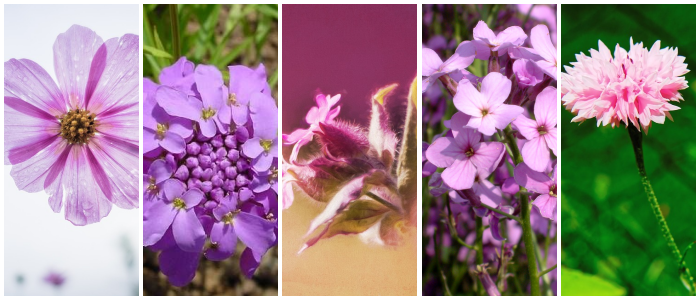 Includes a mix of 9 of the most vibrant and beautiful pink flower varieties. Scatter this mix in your garden and enjoy a beautiful assortment of pink flowers!Wildflower establishment requires some important steps:- Site selection/preparation: It's important to address competition from weeds: pull, till, or use organic herbicides. If planting in the spring/summer you can wait for weeds to germinate, control and then plant the wildflower seeds.
Includes a mix of 9 of the most vibrant and beautiful pink flower varieties. Scatter this mix in your garden and enjoy a beautiful assortment of pink flowers!Wildflower establishment requires some important steps:- Site selection/preparation: It's important to address competition from weeds: pull, till, or use organic herbicides. If planting in the spring/summer you can wait for weeds to germinate, control and then plant the wildflower seeds.
- Seeding: You will want to have good seed to soil contact, broadcasting by hand is a good approach on small plot, may want to mix with an inert carrier, sand or other. Raking in and covering with soil 2-3 times seed thickness.
- Watering: During establishment for the first month, can be from rain in spring or supplement with irrigation.
- Timing: The best time to plant is in spring to early summer and even again in late fall.
This mix includes all of the following seed varieties:GENUS/SPECIES
COMMON NAME

Centaurea cyanus
Cornflower Tall Pink

Clarkia amoena
Godetia Semi Dwf Mix

Cosmos bippinatus
Pinkie Dwarf

Hesperis matronalis
Purple Dame's Rocket

Iberis umbellata
Dwf. Candytuft Fairy Bqt.

Lavatera trimestris
Tree Mallow

Monarda citriodora
Lemon Mint

Silene armeria
Catchfly

Silene pendula
Nodding Catchfly
Wildflowers - Cosmos Flower Scatter Garden Seed Mix
From $299 USDUnit price /UnavailableDescription
Includes a mix of 7 popular cosmos flower varieties. Scatter this mix in your garden and enjoy a beautiful assortment of cosmos flowers!
Wildflower establishment requires some important steps:
- Site selection/preparation: It's important to address competition from weeds: pull, till, or use organic herbicides. If planting in the spring/summer you can wait for weeds to germinate, control and then plant the wildflower seeds.
- Seeding: You will want to have good seed to soil contact, broadcasting by hand is a good approach on small plot, may want to mix with an inert carrier, sand or other. Raking in and covering with soil 2-3 times seed thickness.
- Watering: During establishment for the first month, can be from rain in spring or supplement with irrigation.
- Timing: The best time to plant is in spring to early summer and even again in late fall.
This mix includes all of the following seed varieties:GENUS/SPECIES
COMMON NAME
Cosmos bippinatus
Cosmos, Sensation Mix
Cosmos bippinatus
Dazzler
Cosmos bippinatus
Gloria
Cosmos bippinatus
Picotee
Cosmos bippinatus
Pinkie
Cosmos bippinatus
Purity
Cosmos sulphureus
Sulphur Cosmos
Wildflowers - Lupine Scatter Garden Seed Mix
From $299 USDUnit price /UnavailableDescription
 Includes a mix of 5 popular lupine flower varieties and colors. Scatter this mix of seeds in your garden and enjoy a beautiful assortment of lupine flowers.Wildflower establishment requires some important steps:- Site selection/preparation: It's important to address competition from weeds: pull, till, or use organic herbicides. If planting in the spring/summer you can wait for weeds to germinate, control and then plant the wildflower seeds.
Includes a mix of 5 popular lupine flower varieties and colors. Scatter this mix of seeds in your garden and enjoy a beautiful assortment of lupine flowers.Wildflower establishment requires some important steps:- Site selection/preparation: It's important to address competition from weeds: pull, till, or use organic herbicides. If planting in the spring/summer you can wait for weeds to germinate, control and then plant the wildflower seeds.
- Seeding: You will want to have good seed to soil contact, broadcasting by hand is a good approach on small plot, may want to mix with an inert carrier, sand or other. Raking in and covering with soil 2-3 times seed thickness.
- Watering: During establishment for the first month, can be from rain in spring or supplement with irrigation.
- Timing: The best time to plant is in spring to early summer and even again in late fall.
This mix includes all of the following seed varieties:GENUS/SPECIES
COMMON NAME

Lupinus densiflora
Golden Yellow

Lupinus hartwegii
Dwarf Pixie Delight

Lupinus perennis
Perennial Lupine

Lupinus polyphyllus
Russel Lupine

Lupinus succulentis
Arroyo Lupine
Wildflowers - Annual Cut Flower Scatter Garden Seed Mix
From $299 USDUnit price /UnavailableDescription
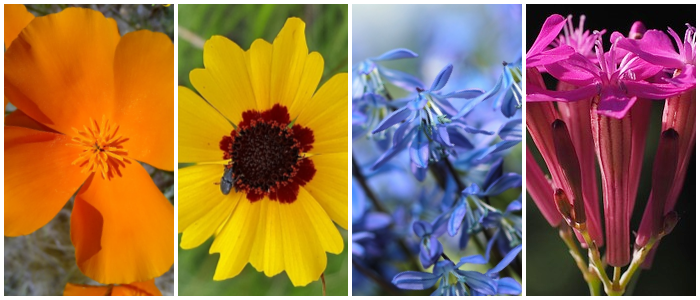 Includes a mix of 25 popular annual flower varieties that will produce a beautiful assortment of flowers suitable for cutting. The mix includes many of the flowers found in floral stores. This annual flower mix will blossom all-year-long creating a bountiful source of flowers.
Includes a mix of 25 popular annual flower varieties that will produce a beautiful assortment of flowers suitable for cutting. The mix includes many of the flowers found in floral stores. This annual flower mix will blossom all-year-long creating a bountiful source of flowers. Scatter this mix of seeds in your garden for the most beautiful assortment of flowers you've ever seen.
Wildflower establishment requires some important steps:- Site selection/preparation: It's important to address competition from weeds: pull, till, or use organic herbicides. If planting in the spring/summer you can wait for weeds to germinate, control and then plant the wildflower seeds.
- Seeding: You will want to have good seed to soil contact, broadcasting by hand is a good approach on small plot, may want to mix with an inert carrier, sand or other. Raking in and covering with soil 2-3 times seed thickness.
- Watering: During establishment for the first month, can be from rain in spring or supplement with irrigation.
- Timing: The best time to plant is in spring to early summer and even again in late fall.
This mix includes all of the following seed varieties:GENUS/SPECIES
COMMON NAME
TYPE
HEIGHT
COLOR

Callistephus chinensis
Aster
A
12 to 36
Blue/Pink/White/Purple

Calendual officinalis
Pot Marigold
A
12 to 24
Yellow/Orange/Cream

Centaurea cyanus
Bachelor Button, Polka Dot Mix
A
12 to 36
Mix

Clarkia amoena
Godetia
A
8 to14
Pink/White

Clarkia elegans
Clarkia
A
18 to 30
Pink/Lavender

Coreopsis tinctoria
Plains Coreopsis
A
12 to 36
Yellow-Maroon

Cosmos bipinnatus
Cosmos, Dwarf Sensation
A
36 to 60
White/Pink/Crimson/Rose

Cynoglossum firmament
Chinese Forget Me Not
A/B
18 to 24
Blue

Delphinium ajacis
Larkspur
A
12 to 36
White/Pink/Blue/Violet

Dimorphotheca aurantiaca
African Daisy
A
8 to16
Orange/Salmon/White

Eschscholzia californica
Poppy, Mission Bells
TP
12 to 18
Yellow/Orange

Gaillardia pulchella
Annual Gaillardia
A
12 to 24
Yellow-Red

Gypsophila elegans
Baby's Breath
A
8 to 18
White

Helianthus annuus
Sunflower
A
24 to 72
Yellow

Helichrysum monstrosum
Strawflower mixed
A
24 to 36
Yellow/White/Red/Pink

Iberis umbellata
Candytuft
A
12 to 18
White/Pink/Violet

Lavateria trimestris mix
Tree mallow
A
24 to 48
White/Pink

Lobularia maritima
Alyssum, tall Sweet
TP
8 to 16
White

Oenotheria lamarckiana
Evening Primrose
B/P
24 to 60
Yellow

Papaver rhoeas
Shirley Poppy
A
12 to 30
White/Pink/red

Phacelia campanularia
California Bluebells
A
8 to 20
Blue

Rubeckia hirta
Black Eyed Susan
A/B/P
12 to 36
Yellow

Silene armeria
Catchfly
A/B
16 to 22
Pink

Tagetes erecta
Marigold
A
12 to 16
Yellow/Orange/Maroon

Zinnia elegans
Zinnia
A
12 to 36
White/Purple/Yellow/Orange.Red
A-Annual
75%
B-Biennial
18%
TP-Tender Perennial
7%
Wildflowers - Hummingbird & Butterfly Scatter Garden Seed Mix
From $299 USDUnit price /UnavailableDescription
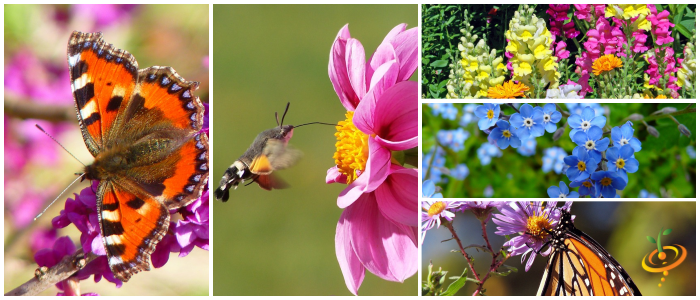
Includes a mix of the 23 of the most popular flower varieties known to attract Hummingbirds and Butterflies! Scatter this mix of seeds in your garden for the most beautiful assortment of flowers you've ever seen.
Wildflower establishment requires some important steps:
Site selection/preparation: It's important to address competition from weeds: pull, till, or use organic herbicides. If planting in the spring/summer you can wait for weeds to germinate, control and then plant the wildflower seeds.Seeding: You will want to have good seed to soil contact, broadcasting by hand is a good approach on small plot, may want to mix with an inert carrier, sand or other. Raking in and covering with soil 2-3 times seed thickness.Watering: During establishment for the first month, can be from rain in spring or supplement with irrigation.Timing: The best time to plant is in spring to early summer and even again in late fall.
This mix includes all of the following seed varieties:GENUS/ SPECIES
COMMON NAME
PLANT TYPE
PLANT HEIGHT (inches)
FLOWER COLORS

1. Asclepias tuberosa
Butterfly Milkweed
Perennial
24 to 36
Orange

2. Aquilegia caerulea
Mrs. Scott Elliot
Perennial
24 to 36
Yellow/Red/Violet/Blue

3. Antirrhinum tetra
Snapdragon
Annual
24 to 36
Lavender/Yellow/Pink/White

4. Callistephus chinensis
Aster
Annual
24 to 36
Blue/Pink/White/Purple

5. Cosmos bipinnatus
Cosmos Sensation Mix
Annual
36 to 60
White/Pink/Crimson/Rose

6. Cynoglossum amabile
Chinese Forget Me Not
Annual/
Biannual18 to 20
Blue

7. Delphinium consolida
Larkspur Giant Imperial Mix
Annual
12 to 26
White/Pink/Blue/Violet

8. Digitalis purpurea
Foxglove
Biannual/
Perrenial24 to 48
Purple/Cream

9. Gilia tricolor
Bird's Eyes
Annual
12 to 18
Lavender-White

10. Lavatera trimestris
Treemallow
Annual
24 to 48
White/Pink

11. Linaria maroccana
Toadflax
Annual
12 to 24
Pink/Yellow/Violet

12. Lobularia maritima
Alyssum, Carpet of Snow
Annual
8 to 16
White

13. Lychnis chalcedonica
Maltese Cross
Perennial
24 to 36
Scarlet

14. Mirabilis jalapa
Four O'clock
Tender
Perennial12 to 24
Red/Pink/Yellow.White

15. Monarda citriodora
Lemon Mint
Annual
12 to 24
Lavender/White

16. Nicotiana alata
Tobacco Plant
Annual
12 to 24
Red/White/Green/Yellow

17. Papaver rhoeas
Red Corn Poppy
Annual
12 to 30
Red
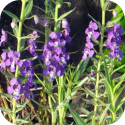
18. Penstemon strictus
Gloxinia Penstemon
Perennial
24 to 36
Blue

19. Salvia coccinea
Scarlet Sage
Annual/
Perennial12 to 24
Red

20. Silene armeria
Catchfly
Annual/
Biannual16 to 22
Pink

21. Tagetes erecta
Marigold Crackerjack
Annual
24 to 36
Yellow/Orange

22. Tropaeolum majus
Nasturtium Dwarf Jewel
Annual
12 to 36
Red/Yellow/Orange/Pink

23. Zinnia elegans
Zinnia
Annual
12 to 36
White/Purple/Yellow/Orange/Red
- From $299 USDUnit price /Unavailable
Description
Cabbage, Brunswick
- Brassica oleracea.
- A heirloom variety dating back to 1924.
- Plant produces a large drumhead type cabbage.
- Used for making kraut.
- Suitable for spring, summer, and fall crops.
- Stores well. Suitable for home gardens and market growers.
Click here for complete Cabbage grow guideAdditional Details
Did you know? ❄️ Cabbage is an annual cool-season crop, hardy to frost and light freezes. A smaller cabbage head has better flavor and can stay in the field longer without splitting. To keep them small, plant close together or, when the head is almost full, give the plant a sharp twist to break up the roots. 😀 Cabbage is a wide spreading foliage plant with handsome leaves that form a tight, hard ball head on a strong central stem. Young plants may bolt if grown at 50F for a long time; however mature plants of late varieties improve flavor in cold weather.
- From $299 USDUnit price /Unavailable
Description
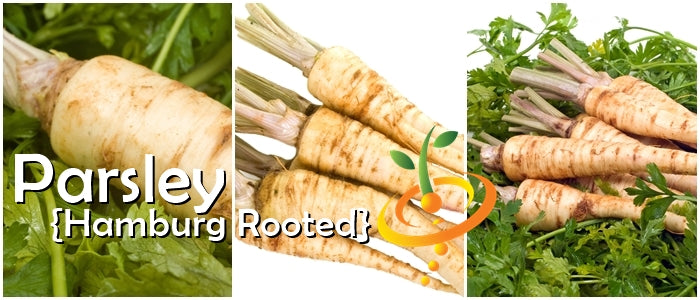
-
A very old heirloom variety dating back to the 1600's
- Hamburg Rooted Parsley is used differently than other parsley plants. It's actually preferred by many European cooks and is typically the main ingredient for many stews
- Hamburg Rooted Parsley is a large edible root with smooth mild parsley flavor
- Very easy to grow
- In Europe root parsley is usually the first choice over parsnips
-
Day to Maturity | 85 days
-
A very old heirloom variety dating back to the 1600's
Sprouts/Microgreens - Bean, Adzuki
From $299 USDUnit price /UnavailableDescription
- Certified Kosher by Chabad House of Western Michigan.
- Certified Organic.
- The Adzuki Bean (Vigna angularis) has been grown in the Far East for centuries.
- Adzuki beans are one of Japan’s largest crops, with annual consumption of over 120,000 metric tons.
- Adzuki beans are often sprouted for only one day, mixed with other sprouts and called a "Crispy Mix" or "Crunchy Mix."
- They are commonly used throughout Asia in a variety of ways.
- Certified Kosher by Chabad House of Western Michigan.
- From $299 USDUnit price /Unavailable
Description
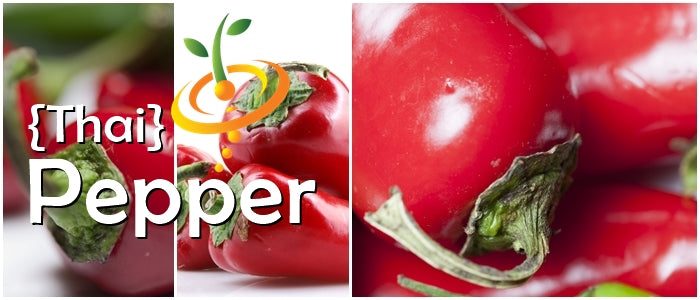
The Thai Hot Pepper hits every type of cuisine with a delightful bolt of lightning. This compact plant throws out lots of slender 1"-3" fruits that grow with their tapered tips up, maturing from popping green to crackling yellow to flashing orange to sizzling red. A type of Bird Pepper, the plant grows to only about 8" tall, so you can plant several close together for a striking ornamental border and more tasty peppers, or interplant throughout the garden.
- High yields
- Drought tolerant
- Edible and ornamental
- Good for containers
SEED PLANTING TIPS
- Botanical name: Capsicum annuum
- Pepper length: 1"-3"
- Scoville heat units (SHU): 50,000-100,000/hot
- Plant support: None
- Depth to plant seeds: .25" deep
- Spacing between plants: 6"-12" apart
- Spacing between rows: 18"-24" apart
- Days to germinate (sprout): 7-21 days
- Germination soil temps: 75F-85F
- Soil needs: 6.0-7.0 pH
- Sun needs: Full sun
- Frost hardy: No
- Planting season: Spring, summer
- # of plants per sq. ft.: Appx. 2-4 plants per sq. ft.
- Days to maturity: 80-90 days
Good companion plants: Basil, Carrot, Cucumber, Eggplant, Okra, Rosemary, Sage, Squash, Tomato
All Peppers ⟐ Hot Peppers 📚 Hot Peppers Grow Guide - From $299 USDUnit price /Unavailable
Description

- Produces deep purple radishes with a white flesh
- Looks incredible! Great for culinary dishes
- The white flesh is sweet and mild in flavor
- Great for selling at farmers markets
- Unique and rare heirloom radish
- Grows well in containers and small spaces
-
Days to Maturity | 25-30 days
Additional Details
Radishes are rich in ascorbic acid, folic acid, and potassium. They are a good source of vitamin B6, riboflavin, magnesium, copper, and calcium. One cup of sliced red radish bulbs provides approximately 20 calories, largely from carbohydrates
Follow SeedsNow.com's board Radishes on Pinterest. - Produces deep purple radishes with a white flesh
- From $299 USDUnit price /Unavailable
Description

- A 1949 All-America Selections Winner
- Grows as a bush
- Produces high yields of 16" long grayish-green zucchini squash with dark green stripes
- Perfect for home garden and market growers.
- Days to Maturity | 65 days
Additional Details
Though considered a vegetable in cooking, botanically speaking, squash is a fruit (being the receptacle for the plant's seeds). Squash can be served fresh (in salads) and cooked (squash stuffed with meat, fried squash, baked squash).
- A 1949 All-America Selections Winner
- From $299 USDUnit price /Unavailable
Description
Lime Basil is as fresh and uplifting as it sounds. The bright green leaves are infused with a zesty lime fragrance and tangy flavor that’s best used fresh in coconut-heavy Asian dishes, seafood dishes, fruit salads, limeade, cocktails, and salad dressings. Add at the end of cooking to preserve the citrus flavor, then garnish with the edible flowers.Harvest the leaves and stems from the top part of the plant, and pinch off edible flower buds as they appear, which prevents the leaves from turning bitter, and signals the plant to branch out and grow more leaves, making a bushier plant.
The more you harvest, the more it grows!
- Fresh, zesty lime-anise flavor
- Culinary and medicinal
- Good for indoor gardens
- Good for containers
- Tons of medicinal benefits!
As a medicinal herb, Basil has been used internally to treat anxiety, colds, colic, cough, depression, diarrhea, fever, flatulence, flu, indigestion, insomnia, intestinal parasites and worms, exhaustion, gastric pain, gonorrhea, lactation problems, migraine headache, nausea, stomach cramps, sore throat, and vomiting, and externally to treat acne, insect bites and stings, loss of smell, skin problems, snake bites.
⚠️ Do not use medicinally while pregnant.
⚠️ Medicinal properties are presented as information only, and are not a recommendation or prescription for use. Consult a medical professional before using any herb medicinally.
As a companion plant, it attracts hummingbirds, pollinators, and beneficial insects, and repels asparagus beetles, cabbage moths, cabbage white butterfly, cabbage worms, carrot rust fly, flies, maggots, mice, mosquitoes, spider mites, thrips, and tomato hornworms.
Shop all Basil Seeds Shop Good Companion Plants for Basil 📚 Grow Guide: Basil 
The Lime Basil plant is very easy to grow and smells extremely fragrant! It has an amazing lemon scent, perfect for homemade lemonade! Use this in all your favorite culinary creations! It grows to the perfect size for planting in containers, and the aroma of just passing by this herb, will take your senses on an enjoyable ride.
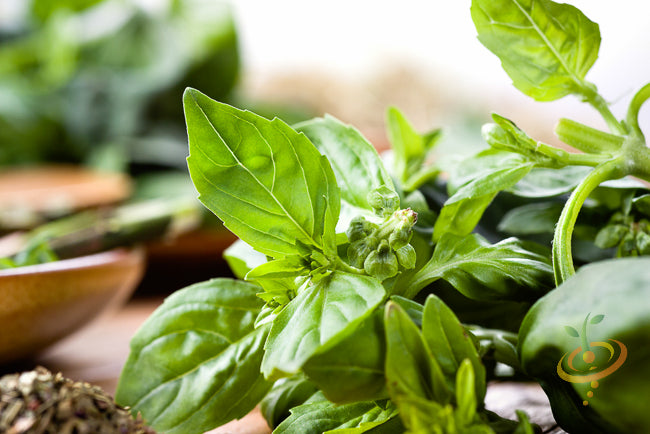
What is Lime Basil?
Lime Basil offers a crisp citrus flavor, with a zesty undertones. It grows as an annual herb with white or lavender flowers. It has many medicinal purposes which makes it an "all around great herb" to grow in your own gardens.
Health Benefits of Lime Basil
From treating some cancers, symptoms of stress, asthma and diabetes, Lime Basil is recognized widely as a medicinal herb.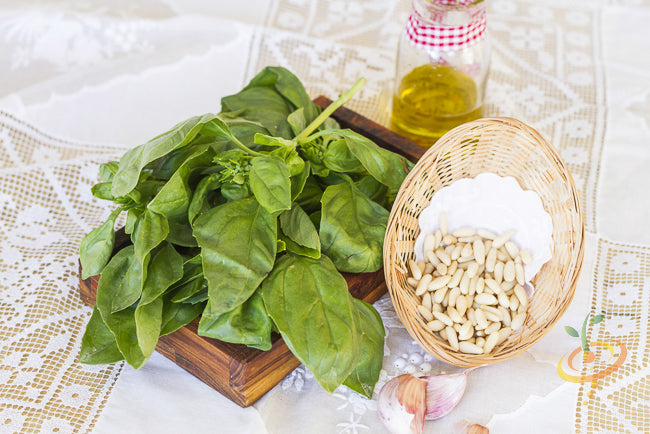
Ways to Consume Lime BasilUsed commonly in fresh cooked recipes, always add it at the last moment so that the cooking doesn't destroy the citrus flavor. It is a favorite ingredient in pesto, and used to thicken soups. Try it with fried chicken, or steeping it in milk to create lovely ice creams or chocolates. Don't toss the flower buds, they are full of flavor and are edible as well.
See Basil Recipes & Growing Tips on our Pinterest Board
Shop all Basil Seeds Shop Good Companion Plants for Basil 📚 Grow Guide: Basil Squash (Summer) - Marrow, Green
From $299 USDUnit price /UnavailableDescription
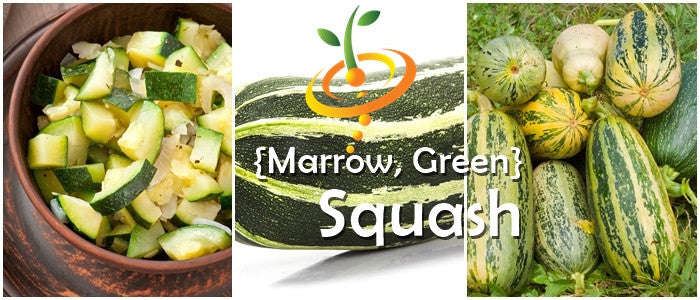
- The Green Marrow Summer Squash produces some of the most beautiful looking dark green squash
- Grows as a compact bush (not as a vine)
- Best when picked at 8" long
- Perfect for small gardens - grows on a compact bush
- Days to Maturity | 85 days
Additional DetailsThough considered a vegetable in cooking, botanically speaking, squash is a fruit (being the receptacle for the plant's seeds). Squash can be served fresh (in salads) and cooked (squash stuffed with meat, fried squash, baked squash).
- From $299 USDUnit price /Unavailable
Description
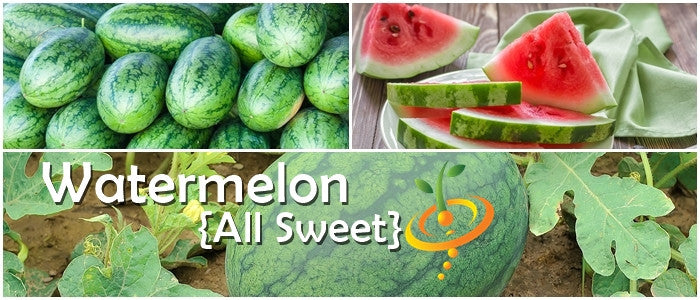
- Plant produces good yields of 25 lb watermelons
- Has bright red flesh
- Perfect for making Watermelon Candy (see how to here)
- Extremely flavorful and extra sweet with a tough rind (helps keep it fruit from bruising)
- Perfect variety for any sized home garden (even market growers)
-
Days to Maturity | 90 days
- Best Months to Plant | [April - June] Watermelons are heat-loving plants that need lots of sun. They grow on a long vine, so make sure to give them plenty of space to roam around.
- Plant produces good yields of 25 lb watermelons
Sprouts/Microgreens - Wheat Grass
From $299 USDUnit price /UnavailableDescription
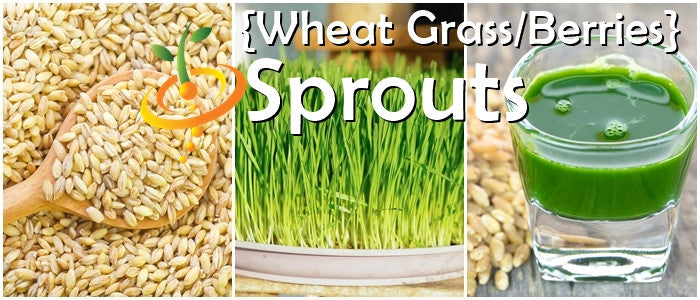 Wheat Grass
Wheat Grass- Wheatgrass is the freshly sprouted first leaves of the common wheat plant, used as a food, drink, or dietary supplement. Like most plants, wheatgrass contains chlorophyll, amino acids, minerals, vitamins and enzymes. Claims about the health benefits of wheatgrass range from providing supplemental nutrition to having unique curative properties.
- Wheatgrass is an excellent source of dietary fiber, just like any whole grains.
- High in folic acid, protein, B-complex vitamins and vitamin E.
- The wheat sprouts are extremely rich in Vitamins A,B, C and E along with other minerals.
-
Day to Sprout | 2-3 days - The wheat grass will be ready to juice in appx. 7 to 10 days
Read: How to Sprout Wheat Berries at Home in a Mason Jar
Read: How to Grow Wheatgrass at Home *Without Soil*
SHIPPING NOTE: This item cannot be shipped to Canada.
- Wheatgrass is the freshly sprouted first leaves of the common wheat plant, used as a food, drink, or dietary supplement. Like most plants, wheatgrass contains chlorophyll, amino acids, minerals, vitamins and enzymes. Claims about the health benefits of wheatgrass range from providing supplemental nutrition to having unique curative properties.
- From $299 USDUnit price /Unavailable
Description

- The Summer Savory plant grows tasty peppery flavored leaves
- This is the herb to use if you want to flavor beans, cabbage, peas, and any other dishes
- Widely used as a medicinal herb for curing sore throats
- Use the leaves to make some tea and you'll be feeling great
-
Days to Maturity | 65 days
- The Summer Savory plant grows tasty peppery flavored leaves
Pepper (Hot) - Habanero, Red Caribbean 🔥🔥🔥🔥🔥
From $299 USDUnit price /UnavailableDescription

The sweet, citrusy flavor, tropical fragrance, and lush green foliage of the Red Caribbean Habanero will remind you of a beach vacation. And so will the searing heat! Produces loads of small 1"-2" wrinkled fruits that twinkle in colors ranging from key lime green to sunrise yellow to sunset orange to sunburn red. Use it to make some haba-haba salsa, broiled halibut with charred pepper cream sauce, or spicy pineapple ice cream.
- Very high yields
- Sweet, citrusy flavor
- Hot enough to make a monkey cough
- Good for containers
SEED PLANTING TIPS
- Botanical name: Capsicum chinense
- Pepper length: 1"-2"
- Scoville heat units (SHU): 300,000-450,000/extra hot
- Plant support: Tomato cage or stake
- Depth to plant seeds: .25" deep
- Spacing between plants: 18"-24" apart
- Spacing between rows: 24"-36" apart
- Days to germinate (sprout): 10-30 days
- Germination soil temps: 75F-85F
- Soil needs: 5.0-6.0 pH
- Sun needs: Full sun
- Frost hardy: No
- Planting season: Spring, summer
- # of plants per sq. ft.: Appx. 1 plant per sq. ft.
- Days to maturity: 85-105 days
Good companion plants: Basil, Carrot, Cucumber, Eggplant, Okra, Rosemary, Sage, Squash, TomatoAll Peppers ⟐ Hot Peppers 📚 Hot Peppers Grow Guide - From $299 USDUnit price /Unavailable
Description
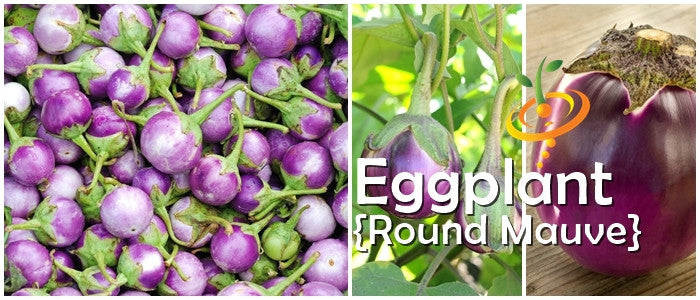
- This heirloom variety produces a beautiful round mauve eggplant with thin skin and a beautiful white flesh
- Best picked with the eggplant is the size of a tennis ball
- Perfect for container gardening
-
Days to Maturity | 80-90 days
-
Eggplant Seeds | Start seed indoors to allow at least 10 weeks for young plants to develop. Plant in rows 3 feet apart, with 2 feet between plants.
Click here for complete Eggplant grow guide
- This heirloom variety produces a beautiful round mauve eggplant with thin skin and a beautiful white flesh
- From $299 USDUnit price /Unavailable
Description

- This rare white heirloom eggplant variety produces ivory-white skinned eggplant and is a very early producer of 5-6 inch long fruit
- The flesh of this eggplant is snow white
- It has a succulent mushroom-like flavor that is absolutely delicious!
-
Days to Maturity | 70 days
-
Eggplant Seeds | Start seed indoors to allow at least 10 weeks for young plants to develop. Plant in rows 3 feet apart, with 2 feet between plants.
Click here for complete Eggplant grow guide
- This rare white heirloom eggplant variety produces ivory-white skinned eggplant and is a very early producer of 5-6 inch long fruit
Endive - Broadleaf, Full Heart Batavian
From $299 USDUnit price /UnavailableDescription

-
This plant produces excellent yields of dark green curly leaves with large tender crisp ribs
- An excellent choice for salads greens
- Endive is rich in many vitamins and minerals, especially in folate and vitamins A and K, and is high in fiber
- Days to Maturity | 80-90 days
-
This plant produces excellent yields of dark green curly leaves with large tender crisp ribs
continue shopping
YOU MAY ALSO LIKE
View all-
$27999 USD
$29999Unit price /Unavailable -
All-in-One Heritage Tomato Garden Variety Pack
$3999 USD$4499Unit price /Unavailable -
All-in-One Mosquito Repellent Garden Variety Pack
$3999 USDUnit price /Unavailable -
All-in-One Medicinal Herb Garden Seed Bank
$9999 USDUnit price /Unavailable -
All-in-One Pepper Garden Variety Pack
$3999 USDUnit price /Unavailable -
All-in-One Chicken Garden Variety Pack
$3999 USDUnit price /Unavailable -
All-in-One Lettuce & Leafy Greens Variety Pack
$3999 USDUnit price /Unavailable -
All-in-One Culinary Herb Garden Variety Pack
$3999 USDUnit price /Unavailable -
All-in-One Homestead Seed Bank
$9999 USDUnit price /Unavailable -
All-in-One Medicinal Herb Garden Variety Pack
$4999 USDUnit price /Unavailable -
All-in-One Root Crop Garden Variety Pack
$3999 USDUnit price /Unavailable -
All-in-One Fall/Winter Variety Pack
$3999 USDUnit price /Unavailable -
All-in-One Sprouts/Microgreens Variety Pack
$3499 USDUnit price /Unavailable -
All-in-One Hydroponic Greens Variety Pack
$3999 USDUnit price /Unavailable -
All-in-One Fall/Winter Seed Bank
$8999 USDUnit price /Unavailable -
All-in-One Sprouts/Microgreens Seed Bank w/Sprouting Jar
$6999 USD$7999Unit price /Unavailable -
All-in-One Culinary Herb Garden Seed Bank
$8999 USDUnit price /Unavailable -
All-in-One Spring/Summer Seed Bank
$8999 USDUnit price /Unavailable -
All-in-One Urban Garden Variety Pack
$3999 USDUnit price /Unavailable -
All-in-One Cucumber Garden Variety Pack
$2999 USDUnit price /Unavailable -
All-in-One Wildflower & Pollinator Scatter Garden Variety Pack
$3999 USDUnit price /Unavailable -
All-in-One SAVE THE BEES! Garden Variety Pack
$3999 USDUnit price /Unavailable -
All-in-One Salsa Garden Variety Pack
$3999 USDUnit price /Unavailable -
All-in-One Tower Garden Variety Pack
$3999 USDUnit price /Unavailable
FEATURED COLLECTIONS
View allcontinue shopping




































































 Includes a mix of 9 of the most vibrant and beautiful pink flower varieties. Scatter this mix in your garden and enjoy a beautiful assortment of pink flowers
Includes a mix of 9 of the most vibrant and beautiful pink flower varieties. Scatter this mix in your garden and enjoy a beautiful assortment of pink flowers












 Includes a mix of 5 popular lupine flower varieties and colors. Scatter this mix of seeds in your garden and enjoy a beautiful assortment of lupine flowers.
Includes a mix of 5 popular lupine flower varieties and colors. Scatter this mix of seeds in your garden and enjoy a beautiful assortment of lupine flowers.






 Includes a mix of 25 popular annual flower varieties that will produce a beautiful assortment of flowers suitable for cutting. The mix includes many of the flowers found in floral stores. This annual flower mix will blossom all-year-long creating a bountiful source of flowers.
Includes a mix of 25 popular annual flower varieties that will produce a beautiful assortment of flowers suitable for cutting. The mix includes many of the flowers found in floral stores. This annual flower mix will blossom all-year-long creating a bountiful source of flowers. 












































































